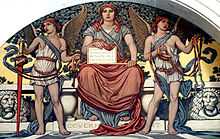Monetary authority
| Public finance |
|---|
 |
|
|
|
Reform |
In finance and economics, a monetary authority is a generic term for the entity which controls the money supply of a given currency, often with the objective of controlling inflation or interest rates. With its monetary tools, a monetary authority is able to effectively influence the development of the short-term interest rates for that currency, but can also influence other parameters which control the cost and availability of money.[1]
Classically, there is one monetary authority for one country with its currency. There are also other set-ups, e.g. when a group of countries have a joint currency like for the euro in the eurozone countries. In this case one monetary authority controls the money supply of one currency for a group of countries.
Generally, a monetary authority is a central bank with a certain degree of independence from the government(s) and its political targets and decisions. But depending on the political set-up, governments can have as much as a de facto control over monetary policy if they are allowed to influence or control their central bank.
There are other arrangements, for example democratic governance of monetary policy, a currency board which restricts currency issuance to the amount of another currency, free banking where a broad range of entities can issue notes or coin.
Americas
Asia
- Hong Kong Monetary Authority
- Maldives Monetary Authority
- Monetary Authority of Singapore
- Royal Monetary Authority of Bhutan
See also
- Central bank
- deflation
- fiat money
- gold standard
- hyper-inflation
- inflation
- monetarism
- seigniorage
References
- ↑ Jahan, Sarwat. "Inflation Targeting: Holding the Line". International Monetary Funds, Finance & Development. Retrieved 28 December 2014.